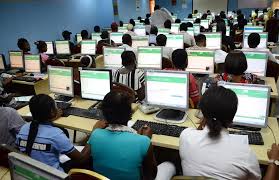The National Examinations Council (NECO) has announced that it will phase out the traditional paper-pencil method of conducting exams. Starting with the November/December 2025 Senior School Certificate Examination (SSCE) External, all exams will be fully computer-based.
The Council made this known in a statement on Wednesday, confirming that the shift to computer-based examination (CBE) will also extend to the school-based SSCE by 2026, with the help of privately-owned CBT centres and public institutions.
NECO explained that it has put strict technical and infrastructural conditions in place for interested CBT centre operators who want to register with the Council. It released detailed guidelines covering hall requirements, system standards, personnel integrity, and security measures to guarantee smooth and credible conduct of exams.
According to NECO, each centre must have at least 150 functional computers or laptops with an additional 10 percent as backup. Each system must run on a minimum of 4GB RAM, Intel dual-core processors, and have modern browsers like Google Chrome, Mozilla Firefox or Microsoft Edge. They must be linked to a robust server with capacity to carry 150 systems at once, and connected on a cable-based Local Area Network. Wireless connections will not be allowed.
The Council also directed that each CBT centre must provide individual cubicles for candidates, with a minimum size of 26 inches by 18 inches by 18 inches. The exam halls must have proper air conditioning, good lighting, visible wall clocks, and CCTV cameras with IP technology. Wireless CCTV or makeshift centres will not be permitted. NECO stressed that centres must be dedicated all year round and cannot be located in cinemas, shopping malls, or markets.
On facilities, the Council said each centre must have a backup power supply, including a generator of at least 40kva capacity and UPS or inverters that can last three hours. Internal toilets, reception facilities, and waiting areas for candidates are compulsory, alongside adequate fencing and security personnel.
For personnel, the guidelines require at least two technical staff and one network engineer per centre. NECO insisted that staff must be dependable and trustworthy, adding that only men and women of integrity will be allowed to oversee the process to ensure credibility of the exams.
The Council said strong MTN or Airtel network coverage is compulsory for all centres. Cables must be neatly trunked, with no flying wires allowed in the hall. It also ruled that candidates will no longer be allowed to bring wristwatches to exam halls, hence centres must provide visible wall clocks for timekeeping.
By this migration, NECO is following the global trend of digitising examinations to reduce malpractice and improve efficiency. The development also aligns with the Federal Government’s plan to modernise the education system and ensure fairer testing processes for Nigerian students.
